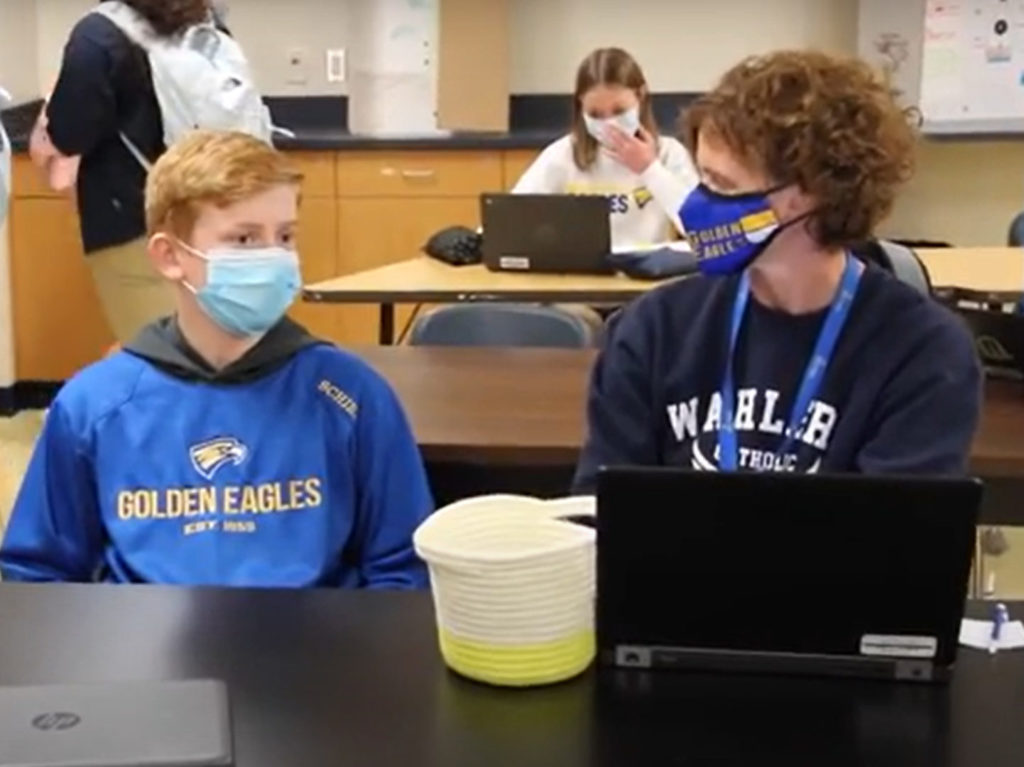Mentoring Creates a Foundation for Academic and Personal Growth
 One of the benefits of a strong mentoring program is a strong school community. Students become more aware of the consequences of their actions and how their work affects others. At Mazzuchelli Catholic Middle School, mentors encourage students to grow as individuals and as a community, and in the case of missteps or defeats, mentors help their students learn resilience by encouraging them to try again.
One of the benefits of a strong mentoring program is a strong school community. Students become more aware of the consequences of their actions and how their work affects others. At Mazzuchelli Catholic Middle School, mentors encourage students to grow as individuals and as a community, and in the case of missteps or defeats, mentors help their students learn resilience by encouraging them to try again.
“Mentoring ensures that no student falls through the cracks,” said Mazzuchelli Principal Doug Varley.
Mazzuchelli students are assigned mentors based on individual needs, social goals, and abilities. These mentors continue to counsel their students through eighth grade. After building a trusting relationship with their mentor, students are able to discuss social, academic, and personal goals related to the 16 Habits of Success.
“The goal of the first meetings with mentees is to get to know the students – interests, hobbies, attitudes about school – and develop a rapport,” said Rick Hefel, mentor and eighth-grade teacher. “In these early meetings, it is important to establish and maintain a positive/optimistic atmosphere in both the mentoring classroom and each mentoring session. Through this atmosphere, it is my hope that the students begin to see themselves, the mentor group, and me as being on the same team.”
Once the mentors have established a relationship with their mentee students, the sessions tend to move from a mentor-led discussion to a student-led conversation that includes not only academic goals, but personal goals and insights as well.
“It amazes me how well the students can talk about their learning and the Habits of Success – what works for them or what they need to work on to be more successful,” said Jolene Belken, mentor and seventh-grade teacher. “I have had a student share with me as an eighth-grader that he needs to work on empathy because he realized he didn’t do a very good job with it over the last couple of years. When I ask the student about it, he shares that he feels he has more friends now because he is engaging in more conversations to get to know his peers better this year. He seems happier at school also!”
The mentoring program was initiated in 2016 with the adoption of Personalized Learning and has since been expanded to include all Mazzuchelli students because of the obvious benefits.
“With two years of mentoring underway, we were already seeing the students benefit from making connections and staying on track with their academic workload,” said Kate Dean, Mazzuchelli guidance counselor. “We thought that all students could benefit from having an adult ‘cheerleader’ assisting the students with whatever their needs might be.”
Mentor time is now scheduled for 40 minutes a day for all students. Students meet with their mentor at least 10 minutes weekly during mentor time. The rest of the time is designated to Self-Directed Learning. The mentor relationship is key in helping students develop accountability in their academics and recognizing areas in which they need to improve.
“Some mentees may start off well and then they seem to get off track for whatever reason,” said Belken. “With our weekly meetings, we check-in and talk and try to get to the root of the issue of why they may be getting off track. More times than not, the mentee knows why and shares that with me. Then we have a conversation on what he/she can do moving forward.”
In addition to the assigned mentor, students also benefit from having peer support in mentor groups. Each mentor is assigned a group of 14-16 students in the same grade level. These mentor groups foster community building.
“Through the positive atmosphere and activities, students create the support network within the mentor group mostly by themselves,” Hefel said. “During the activities, they begin to look out for each other and make sure that everyone is included.”
Rapport is built between mentor groups on Wednesdays with Faith in Action activities. Belken shared that this mentor group time allows students to accept individuals for “who God created them to be.” With COVID restrictions, outside service projects have been put on hold, but other activities include reflecting, praying, sharing, playing games, and decorating classroom doors.”
“My mentees can see they are not alone in some areas of their lives,” Belken said. “They can celebrate with each other, develop empathy toward each other, and get to know each other more – especially since we have been together for three years. It brings me joy when I walk into my room and see my mentees chatting, smiling, and laughing with each other.”

Catherine Curtiss is a senior at Wahlert High School. She’s involved in cross country, the treasurer for NHS, and is president for STOP and Creative Writing Club. Catherine is also the fall 2020 senior intern for the Holy Family Enrollment and Advancement offices.
